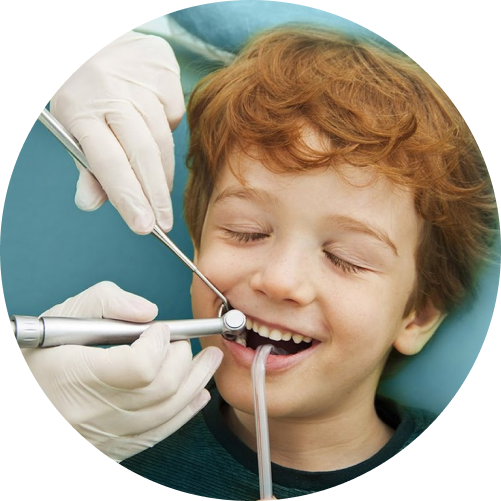Failing Restorations
Dental restorations, such as cavity fillings or dental crowns, are usually successful, solving dental pain or damage. But occasionally, your child may jexperience failed restorations. There are many causes of failed restorations. If you notice a problem with your child’s bite or with pain while chewing, call the pediatric dentists at Tiny Smiles Pediatric Dentistry in Woodbridge, NJ for solutions.

What Are Failing Dental Restorations For Kids?
Dental restorations repair or replace a child’s cracked or broken teeth. While modern dentistry uses advanced procedures and long-lasting materials, the restorations sometimes fail. Failing restorations cause pain in your child’s mouth because of exposed nerves. Untreated restorations that have failed can lead to serious oral health issues, including abscesses.
Common restorative treatments include fillings, crowns and root canal treatments. If any of these restorative treatments fail, your child requires urgent care attention by an experienced pediatric dentist to repair or replace the dental restoration.
The expert team of dentists at Tiny Smiles Pediatric Dentistry n Woodbridge, New Jersey, identifies the failed restoration and determines what treatment is needed. The board certified dentists at this NJ practice use advanced dentistry technology and procedures to promote your child’s dental health.
Restorations fail for different reasons. Your New Jersey dentist explains the warning signs of restoration failure and other dental problems during your visit.
Sensitivity. If your child complains of tooth sensitivity, a failed restoration may be the culprit. A properly placed dental restoration conforms to your child’s bite and doesn’t cause discomfort. A dental restoration that’s sensitive to temperature changes requires a dentist visit.
Pain. A successful dental restoration resolves problems, such as pain. If your child complains of recurrent pain after a dental restoration, visit your dentist for a review.
Physical damage. Visible damage to restorations such as crowns is a warning sign of failure. Fractured, chipped or cracked restorations are a sign that the integrity of the restoration has been compromised.
Discolored restoration. A discolored dental restoration is a warning sign of a failed restorative treatment. Modern restorations are resistant to staining, so discoloration indicates damage to the restoration.
Bad breath. If your child develops bad breath weeks or months after a restorative treatment, visit the dentist for a review. A failed restoration creates pits in which food and oral bacteria get trapped.
A bad taste in the mouth. Restorations that leak into the mouth may cause a bad taste.
Oral health complications. After a dental restoration, your child expects pain relief and the best dental procedures deliver it. If problems, such as tooth decay or a gum infection, appear near the restoration, consult the pediatric dentist to confirm if the restoration has failed.
Bite problems. Pediatric dentists fix dental restorations to ensure a stable bite. If your child complains of a problem during mealtimes, a failed restoration may be the problem. A changed bite indicates that teeth have shifted position, possibly caused by failed restorations.

What’s the Treatment for Failing Dental Restorations?
Failing restorations in kids vary in type and size, and a pediatric dentist only suggests treatment after a diagnosis. At the office, the dentist examines your child’s mouth and performs diagnostic imaging to assess the extent of damage. Treatment for failing dental restorations include:
The dentist may recommend replacing your child’s failing restoration. The damaged crown, filling or veneer is among the restorations a dentist can replace.
Pediatric dentists sometimes recommend custom-made restorations to reduce the risk of failure.
Before replacing a failed restoration, your pediatric dentist does further tests to determine if your child has underlying issues, such as periodontal disease or a bad bite. Treatment of such problems increases the success rate of the restoration.
Your child’s dentist discusses different ways to reduce the risk factors that caused the restoration to fail.
At Tiny Smiles Pediatric Dentistry, friendly pediatric dentists want you to understand everything about the dental procedures done on your child. The dentist explains the risks and offers guidance to prevent dental restoration failure. Contact your pediatric dentist at Tiny Smiles Pediatric Dentistry in NJ today to get help if your child has a failing restoration.
What Causes Failing Restorations?
Most dental restorations last for years, but these appliances fail for several reasons. A failing restoration requires urgent medical attention to stop further dental damage. The major causes for restoration failure include:
- Tooth decay underneath the restoration, a condition called secondary
dental caries - Damage of the restoration material caused by trauma, excessive force or bite problems
- Extreme conditions in your child’s mouth, including temperature fluct-uations, PH cycling, humidity or the presence of microorganisms
- Poor bonding of the restoration material to the child’s tooth
- Improper cavity filling or a damaged crown
- Restoration material failure through wear
- Damage from chewing a hard material, such as ice
- Post-procedure sensitivity
If your child complains of tooth discomfort or you note any problem after a restorative treatment, consult your NJ pediatric dentist. A failed dental restoration requires a review and replacement to prevent other dental complications.


